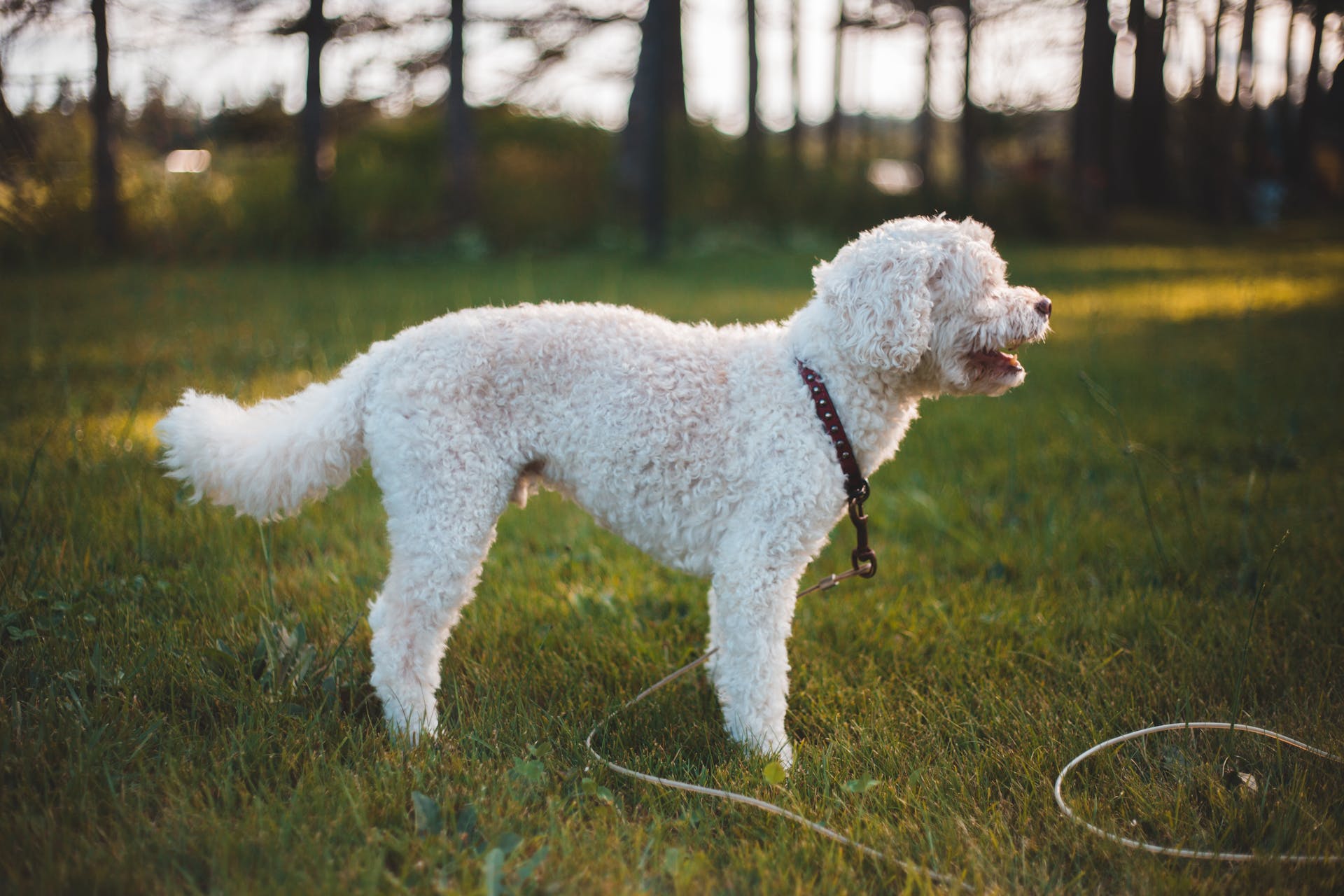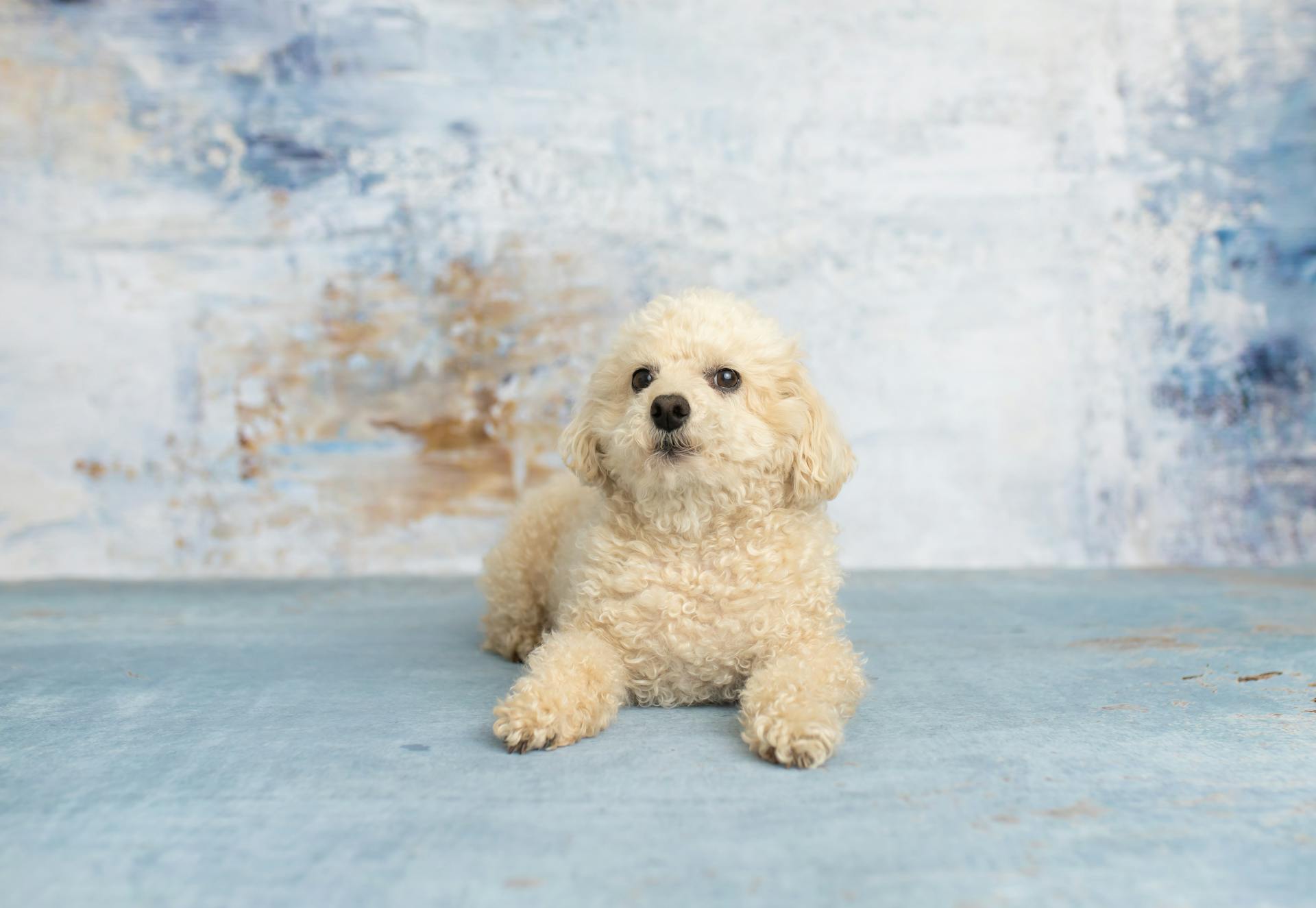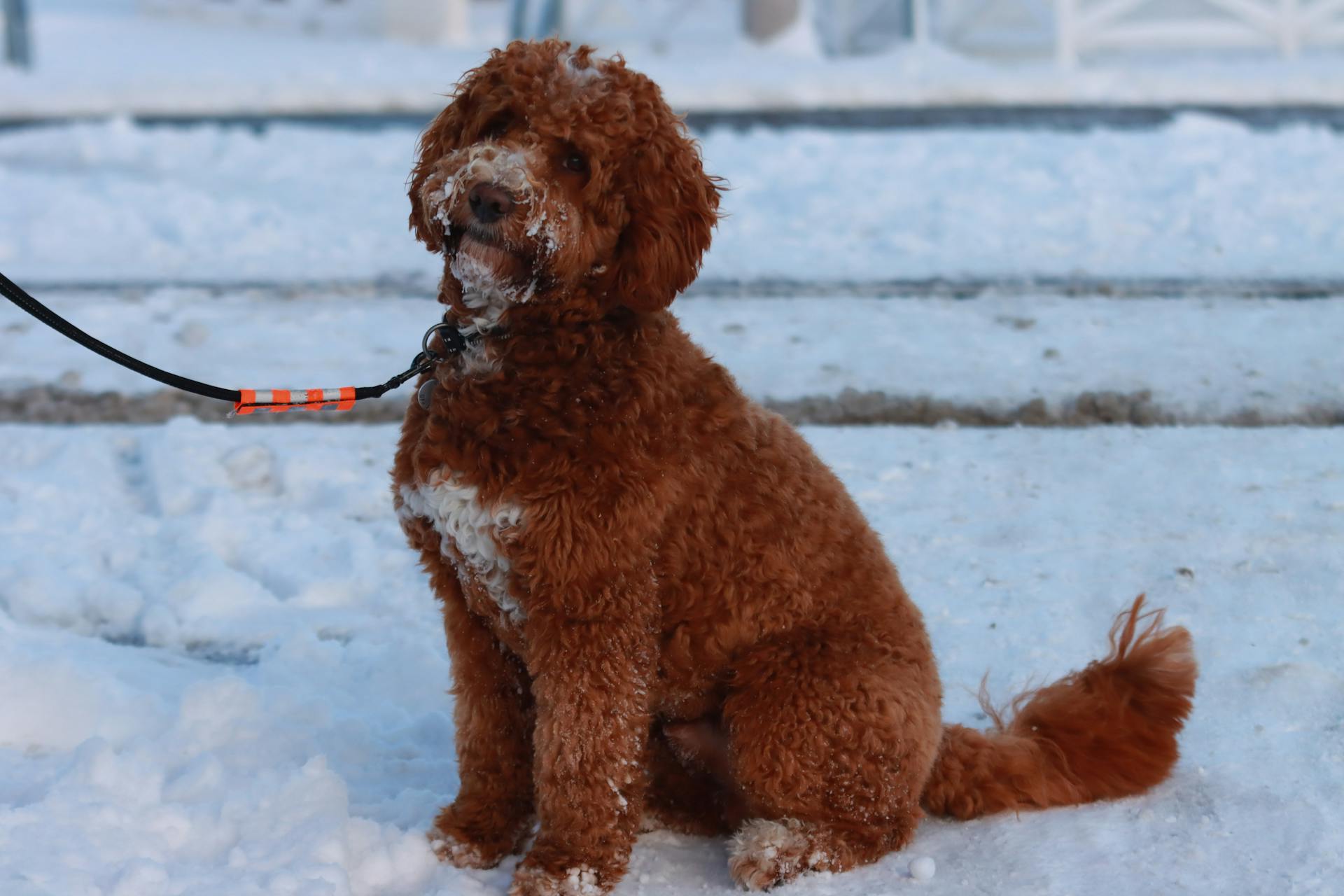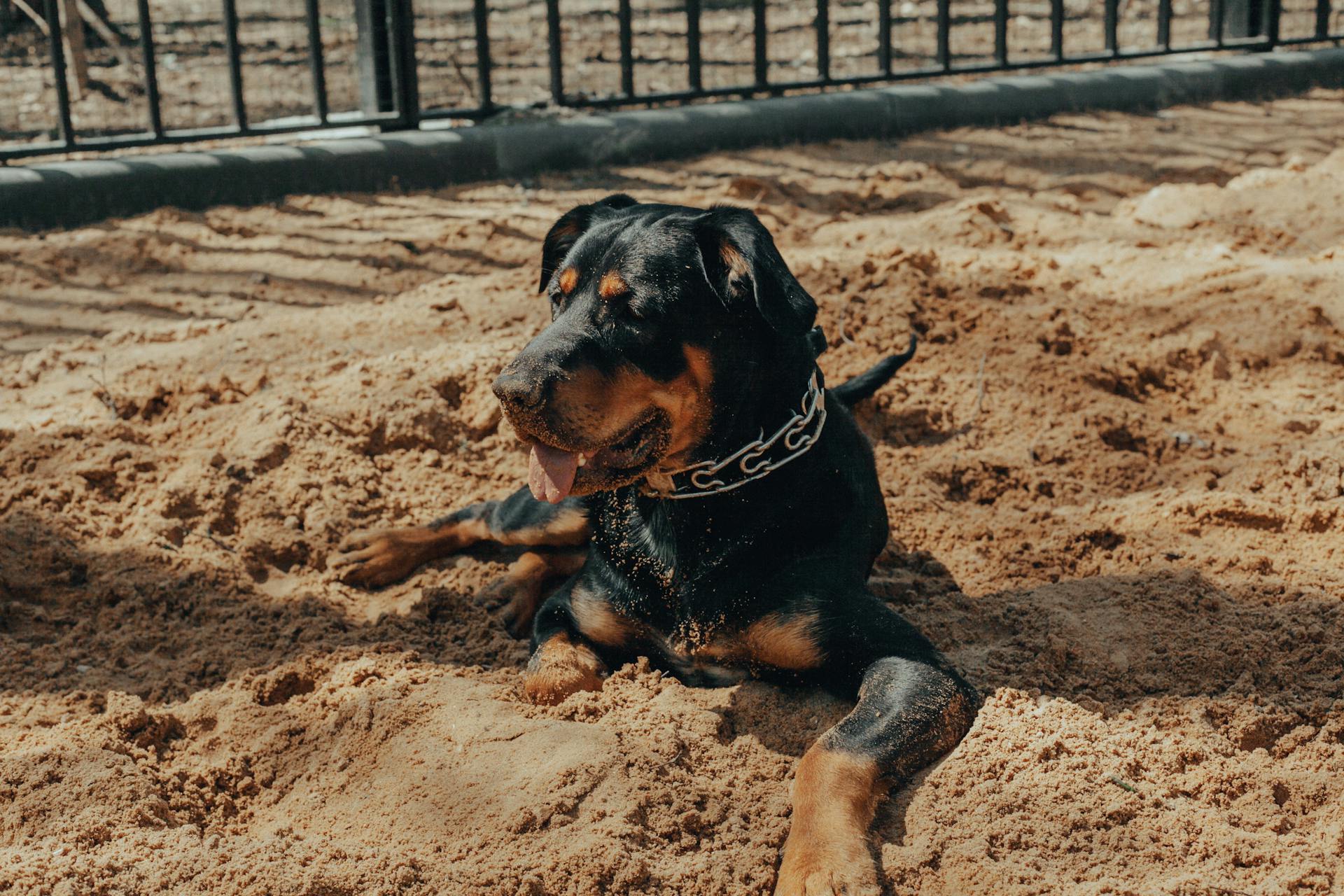
Toy Poodles are one of the smallest dog breeds, weighing between 6-14 pounds and standing about 10 inches tall.
They are highly intelligent and trainable, which makes them a popular choice as family pets and show dogs. Toy Poodles are known for their friendly and outgoing personalities.
Toy Poodles have a low-shedding coat that requires regular grooming to prevent matting and tangling. They come in a variety of colors including black, white, silver, and apricot.
Care and Upkeep
Toy Poodles are relatively low shedders, making them a great option for people with allergies. They still require regular grooming to prevent matting.
Daily brushing down to the skin is necessary to prevent a shell of matted hair from forming around their body. This can be a challenge, but it's a crucial part of their care.
Their coats should be clipped every six weeks, either by a professional groomer or by learning how to do it yourself.
Grooming
Grooming is a crucial aspect of Poodle care. Their coats can become matted if not properly maintained, requiring daily brushing down to the skin to prevent a shell of matted hair from forming.
Daily brushing is essential, especially for show dogs with massive coats that need daily brushing and wrapping. For non-show dogs, regular brushing is still necessary to prevent matting.
Poodles should be clipped every four to six weeks by a professional groomer. This helps prevent matting and keeps their coat looking its best.
Regular grooming also extends to ear care, which should be checked and cleaned by a groomer about every six weeks. This is especially important for Toy Poodles, which require regular ear care to prevent infections.
While some Poodles can be low-shedding, their coats still require regular maintenance to prevent matting and tangling. This is especially true for Toy Poodles, which can be prone to matting if not properly groomed.
Suggestion: Poodle Cuts for Toy Poodles
Nutrition and Feeding

Small dog breeds like the Toy Poodle have a fast metabolism, burning energy at a high rate. This means they need to eat little and often to keep their energy levels up.
Their small stomachs can't hold a lot of food, so they require frequent meals. I've seen many owners struggle to figure out the best feeding schedule for their small breed dogs.
Small-breed foods are specifically designed with smaller kibble sizes to suit smaller mouths. This also encourages chewing and improves digestion.
A balanced diet is essential for your dog's overall health and well-being. A diet that's too rich or too sparse can lead to weight issues or other health problems.
Small breed dogs need to eat little and often to keep their energy levels up, so it's essential to choose a food that's designed for their specific needs.
Explore further: Health Problems with Toy Poodles
Personality
Toy Poodles are known to be highly intelligent and trainable, making them a joy to work with.
They're also naturally inclined to be good watchdogs, alerting you to potential visitors with a loud bark, but they're not aggressive.
Their playful nature means they thrive on interaction and attention from their family, so be prepared to include them in all your activities.
Toy Poodles are highly protective of their family, which makes them loving and loyal companions.
If you're looking for a dog that's always up for a game or a cuddle, a Toy Poodle is an excellent choice.
They can become destructive if they get bored, so make sure to provide them with plenty of mental and physical stimulation.
Toy Poodles bond closely with their owners, which is why they don't like to be left home alone for extended periods.
Their goofy streak is adorable, and they love to play, making them a wonderful addition to any family.
Poodle History and Origins
The Poodle breed originated in Germany as a duck hunter dog in the 15th century, later evolving into a distinct breed in France.
A unique perspective: Teacup Poodle Breed
The Standard Poodle was developed as a retrieving water dog in the 1600s, while the Miniature and Toy Poodles were created as smaller versions of the original breed.
These smaller Poodles were bred to serve specific purposes, with the Toy Poodle serving as a companion to the wealthy merchant class.
The Kennel Club in England registered their first Poodle in 1874, while the American Kennel Club registered their first Poodle in 1886.
Poodles were considered rare in the US until World War 2, but quickly became one of the most popular dog breeds in the country by the mid-1950s.
The Toy Poodle and the Miniature Poodle were initially referred to as the same breed, but were later differentiated as Toy Poodles were under 28cms and Miniature Poodles were over 28cms but under 38cms.
Health Concerns
Toy poodles are generally a healthy breed, but like all living things, they can be prone to certain health issues. Addison's disease, also known as Hypoadrenocorticism, is a serious condition that can be caused by an insufficient production of hormones by the adrenal gland.
One of the early signs of Addison's disease is a poor appetite, which can be a warning sign that something is wrong. If you notice your toy poodle isn't eating as much as usual, it's a good idea to get them checked out by a vet.
Gastric Dilation Volvulus, or GDV, is another health issue that toy poodles can be prone to. This is a serious condition where the stomach twists and cuts off blood flow, which can be life-threatening if not treated quickly.
Some other common health problems that toy poodles can experience include thyroid issues, epilepsy, hip dysplasia, sebaceous adenitis, and Von Willenbrand's Disease.
Here's a list of some of the health issues that toy poodles can be prone to:
- Gastric Dilation Volvulus (GDV)
- Thyroid Issues
- Epilepsy
- Hip Dysplasia
- Sebaceous Adenitis
- Von Willenbrand’s Disease
Training and Behavior
Toy poodles are a joy to train, thanks to their clever nature and love for working with their owners. They excel in various dog sports, such as mini agility and heelwork to music, and even obedience.
Poodles are quick to learn, which makes training a breeze. In fact, they thrive on mental and physical stimulation, so training and working with their owner will keep them happy and relaxed.
Toy poodles have a high rating for being easy to train, a 5/5, which is impressive. This means that with patience and consistency, you can teach your toy poodle a wide range of skills and behaviors.
Here's a quick rundown of their training and behavior traits:
Training Poodles
Training Poodles is a joy, and it's not just because they're clever and quick to learn. Poodles excel at dog sports like mini agility, heelwork to music, and obedience, making them a great choice for active owners.
Their intelligence and love for working with their owner make training a breeze. In fact, training and working with their owner will keep this busy little dog happy and relaxed.
One of the most impressive things about Poodles is their ease of training. They're consistently rated 5/5 for being easy to train, which is a testament to their intelligence and willingness to please.
Here's a breakdown of Poodles' training abilities and needs:
Keep in mind that Poodles do require regular exercise to stay happy and healthy, but their exercise needs are moderate, rated 4/5.
Key

These small dogs have a relatively long lifespan of 12 – 15 years.
Their size is one of their most distinctive features, with a height of under 28cm. This compact size makes them a great fit for city living or small homes.
You'll find them in a range of colours including blue, grey, silver, brown, apricot, and cream.
Readers also liked: Do Toy Poodles Stay Small
Frequently Asked Questions
What are the pros and cons of a Toy Poodle?
Toy Poodles are generally peaceful and accepting companions, but they require regular grooming and daily exercise and attention to thrive. They're a lively breed that needs consistent interaction to stay happy and healthy.
Can Toy Poodles be left alone?
Toy Poodles don't handle long periods of alone time well and may experience separation anxiety. They thrive on companionship, so consider their social needs when planning your schedule.
Featured Images: pexels.com


